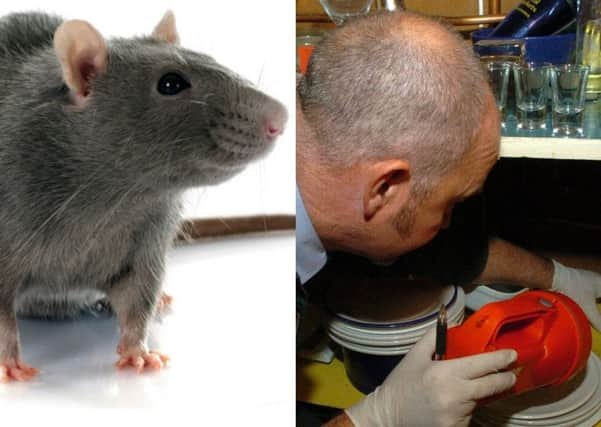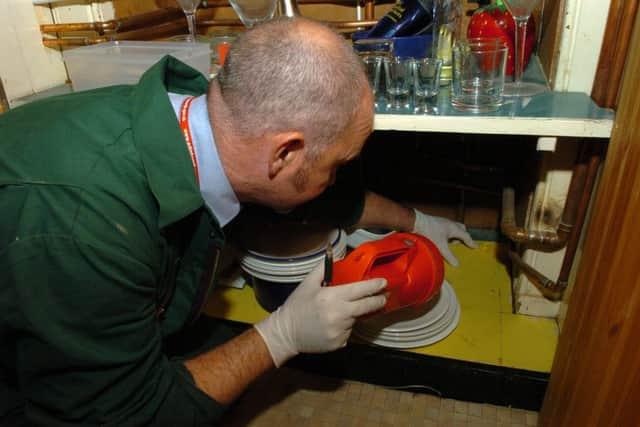Plague of super rats ‘immune from poison’ invading Scottish homes


Edinburgh is said to be the worst place in Scotland for rodents, with the blame being placed on ‘lazy’ neighbours who do not dispose of waste properly in shared areas.
The council’s pest control was called out every two hours last year to tackle vermin from rats to cockroaches across Edinburgh.
Advertisement
Hide AdAdvertisement
Hide AdSylvia Hill, owner of Wee Critters, told the Evening News that jobs at rat-infested properties had risen by 20 per cent year on year and is adamant the issue is only going to escalate.


She insists residents who do not dispose of their rubbish appropriately are the main perpetrators behind the outbreak.
The issue is magnified when collections of household bins are missed by the council’s waste management team.
New figures reveal there were more than 50,000 missed bin collection complaints lodged to the city council in 2018.
Advertisement
Hide AdAdvertisement
Hide AdSylvia, 62, highlighted Gorgie for having a rampant rodent problem and pinpointed Fountainbridge as a hotspot for cockroaches while bedbugs are usually found under the covers of those living in the city centre.
She said: “We cannot cope with the demand we’re receiving at the moment.
“Apartment blocks with bin stores when rubbish is left at the side of the bins leaves the increase in rats to be horrendous.
“We’re never out of Gorgie. Caledonian Crescent is the worst street in Edinburgh, probably in Scotland.
Advertisement
Hide AdAdvertisement
Hide Ad“A lot of Edinburgh mice are now immune to amateur poisons you can buy from the shop. It really is a major issue in Edinburgh at the moment.”
A total of 4,788 pest control requests were received by the city council last year – the equivalent of 13 a day – with the Forth, Sighthill/Gorgie and Craigentinny/Duddingston wards proving to be the most problematic areas of the city.
But the authority said it had not experienced a significant increase in vermin callouts.
Cllr Lesley Macinnes, Convener for Transport and Environment, said: “We remain surprised by these comments and would be interested in hearing from the pest control firm, as this information goes against our evidence of what is happening in the city.”
Advertisement
Hide AdAdvertisement
Hide AdCllr Macinnes was forced to apologise to thousands of residents after receiving floods of complaints in relation to the new waste collection system that was implemented in October last year. The authority tallied more than 5,000 calls from angry residents in the space of just three weeks. Before the service was changed to a four-day rota, the council received an average of 400 weekly complaints.
Recent figures suggest the problem has been ongoing for a number of years. In 2015, a total of 44,778 missed waste collections were received by the council. This figure rose to 52,093 in 2016 before substantially dropping to 40,939 in the following 12 months. But last year saw a 25 per cent rise in complaints to the council, with the new waste management system understood to have been a factor behind this. Sylvia insists human behaviour must change in order to help bring the city-wide dilemma to a halt.
She said: “Bad human behaviour is a main reason why there are so many rats.
“People feeding birds and stupidly feed foxes. If you remove the food source then you get rid of the rats. Every bin needs a sign on it to express that if rubbish is not placed inside then they will be fined.
“There needs to be a deterrent to stop this getting worse.”
Advertisement
Hide AdAdvertisement
Hide AdCllr Macinnes added: “We fully appreciate the frustrations brought about last year when we first started rerouting waste collections – frustrations which were well documented.
“I’m pleased to see that performance has significantly improved in recent weeks and we fully expect this to continue.
“We are also working hard on a communal collections redesign project, which is intended to further improve waste and recycling in communal areas.”
